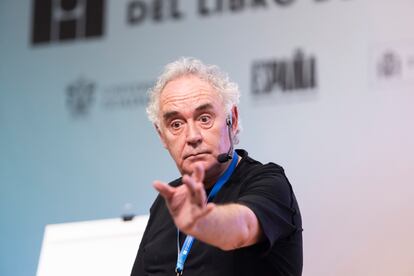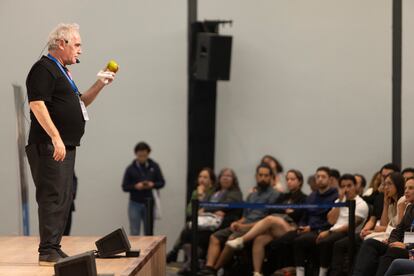What’s so original about an iPhone or an al pastor taco? The Spanish chef Ferran Adrià asked that question to a packed auditorium in one of the main halls of the Guadalajara Book Fair (FIL) to immerse himself in a master class on the search for innovation. The Catalan wore a black t-shirt and pants on Sunday night and like a Steve Jobs of haute cuisine, he spoke for almost two hours about his career, the ups and downs of his career, his time at the sink of a restaurant, cooking during military service. to prepare food for an admiral, until his arrival at the legendary elBulli, the restaurant where he would later become one of the great luminaries of the kitchen. Adrià cooked up a speech whose main ingredient was optimism: with determination you can achieve excellence, differentiate yourself from the crowd, create until you reach perfection and innovate, because an iPhone or a good al pastor taco can conquer the pleasure of a consumer eager for new experiences.
The meeting began with great expectations. As the enormous room filled up, the curious did not take their eyes off the table on the floor. What were a couple of oranges and a glass full of tomato juice doing there? What will the magician of the kitchen prepare? Adrià came out on stage applauded by an expectant audience and assured that he had come to have a good meeting, because the most important thing in life, he said, “is to have a good time.” What I wanted was to provide a bite of optimism for those who want to immerse themselves in a difficult world, that of haute cuisine, where entrepreneurship is hard, and know how to move appropriately to achieve success. He recalled that there are 300,000 eating and drinking establishments in Spain, 10 million restaurants in the world, 17,000 mentioned in the Michelin Guide, but “no more than 10 seek the highest level of innovation.” And he gave the first piece of advice: “Young entrepreneurs must understand that management is important.” In other words, it is not just about wanting to become a cooking genius, but also knowing how to manage to prevent the ship from sinking hit by the iceberg of chaos.
Adrià gave his experience as an example to achieve success. It went back to the age of 17, when he told his parents that he wanted to go out into the world, to escape from that working-class neighborhood on the outskirts of Barcelona. He was a rather “normal” student and what he wanted was to go to Ibiza, that Spanish island in the Mediterranean now packed to the brim with tourists, to have a good time. Well, if you want that, the father replied, you work to pay for it. And life wanted him to enter the kitchen, but not through the front door, but as he washes dishes. “It was lucky to be in a suitable, fundamental place,” said the chef. The head of the kitchen gave him the The Culinary Guide by Auguste Escoffier and the boy, who did not have much desire for study at that time, read it from time to time. “I had no interest. I think that in life there is friction, affection, love, passion and obsession and I was more of friction,” he joked. He then returned to Barcelona, did his military service and another good move in life put him as cook for the admiral of his troop, preparing meals for his guests. It was a colleague who told him about a possible position at elBulli, on the Catalan Costa Brava. “It changed my life, because we were talking about food in Spain, which was zero patatero in the world of gastronomy,” he stated.
In 1984 the restaurant’s chef resigned and Adrià was left in charge. It was then that his personal career for innovation in the kitchen began. At the time, French cuisine dominated and at first they wanted to copy it, but a few years later the chef participated in an event in Nice and asked a French chef for advice. The formula is easy, he replied: do not copy. He returned to elBulli and in “a very naive way” they began to create their own menus. Almost a decade later the restaurant was at the peak of haute cuisine, at its highest creative level. It was all about running and tension, preparing 44 preparations in two and a half hours, a demand for two million reservations, an immersion in the physical and mental limits of tasting. “80% of the world’s innovation in gastronomic restoration has been done at elBulli,” stated Adrià. The chef was 50 years old when he decided to close the restaurant, but he decided to open a foundation to help entrepreneurs who wanted to find excellence by the fire. “I am delighted to be a chef, but my career is much more than that,” he said.

And there began the relationship with science, as if it were a special ingredient in the kitchen. “I began to learn to learn, like a sponge that absorbs everything.” He went from being a chef and businessman to relating to many areas of knowledge with the idea of defining what cooking is. Is an orange a fruit or a vegetable? How does science create that hybrid? To what limits can you go with the ingredients? “The four most important chefs in the world went to bed like fools, wondering what cooking is,” the chef confessed. He understood that the important thing for haute cuisine was to seek information, delve into knowledge, understand and form objective criteria. And he began to work on an encyclopedia of gastronomic restoration, to help those who come behind with the creation process in the kitchen, innovate in the kitchen, understand why an iPhone or an al pastor taco can be something original, that can differentiate ourselves from the crowd, create until reaching perfection and innovate, conquer the pleasure of a consumer eager for new experiences.

